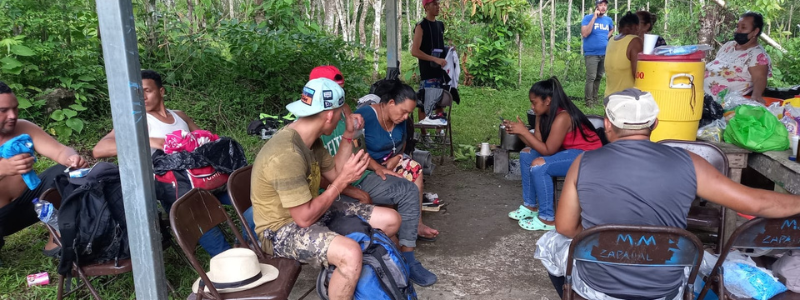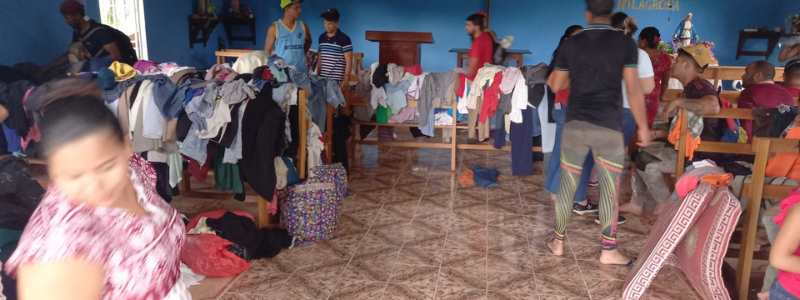As members of the RFM-Panama Team, once again we want to share the current situation of migrants who are in transit through these lands
The Panamanian people—with their unions, teachers, health workers, farmers, merchants, institutions, and indigenous communities—have been participating in citizen protests and a “national strike” since July 8. For this, they have closed the roads of the international highway that runs through the entire country and ends at the border with Costa Rica, as well as other important highways in the cities. In this civil context of protest, some four thousand migrants who crossed the Darién from Colombia gathered in three shelters.
The Darién Rainforest in Panama is known as the “Darién Gap” because there is no road access between Colombia and Panama. Both countries are separated by this inhospitable jungle with a great biodiversity. The idea of the Darién Gap as being a “stopper” changed when the migrants, coming from different countries, began to cross the jungle from Colombia. The numbers have been massive since 2016, although even in 2012 some bodies of migrants began appeared in the river, as Jorge Ayala, coordinator of the Human Mobility Pastoral in Panama, testifies.
Currently, migrants leave Necoclí, Colombia, moving by sea (at a cost that can be around $200 dollars) to Capurgana or Acandi, a point of land where it is Colombian jungle. From there begins the journey through the jungle, between hills and rivers, together with the poisonous animals that inhabit it, such as spiders and the thousands of mosquitoes that leave bodies marked with a large number of bites.
This tour through the jungle can last between two and a half days to five, and some speak of 10 days of travel. The days of the rainy season can vary, and so do the days to wait for the flow of the rivers to drop. Because they are families with children, they are likely to be moving more slowly. The first sign that announces that they are arriving in Panama is when they see a place known as the “grandfather,” a house where a “grandfather” lives, as it is known by tradition. Then they arrive at the first refuge that is in the town of Canaán Membrillo and from there to the other refuge that is in San Vicente.
They are caravans of literally hundreds of people that are crossing the Darién jungle. They are then transferred to Planes de Gualaca, Chiriquí, which is about a 10-hour bus ride from Darién. This controlled transfer is Panamanian Migration Service; the cost, which is assumed by the migrants, is around $40 USD for the trip. There they arrive at the “Gualaca” refuge. Then they seek to move to the border with Costa Rica, doing this on their own on buses from the area. This border is about three to four hours away by public transport.
Among the international agencies that are assisting the migrants who cross the Darién are Doctors Without Borders (MSF), which are in San Vicente giving care to almost a hundred people daily. Among the conditions that migrants bring, we find people with stomach problems, body aches, and foot and skin damage due to bites. This is aggravated by the violence and violations to which women are subjected by armed groups that rob and assault them, along with sexual violence.
MSF has denounced the fact that Panama does not offer dignified conditions and the requirements of international standards for the care, reception, and protection of migrants who are arriving through the Darién jungle.[1]
The MSF Organization is concerned about the increase in the migratory flow through this tropical forest, especially due to the levels of violence. One of their reports states: “the problem that we also faced is that from Canán Membrillo to San Vicente the assaulted women took time to arrive and then we could no longer offer the necessary prophylaxis after a rape, which must be administered within 72 hours after the rape aggression and that aims to prevent infections and unwanted pregnancies.”[2]
The situation of the migrant who crosses the Darién is not only the problem of the inhospitable passage through the jungle, but they are added, at present, by the criminal gangs that are operating in the area, without being intervened by the border security of Panama. Another notorious situation on the faces of the migrants who are passing through these shelters is mental health, which is a profound evil that is not revealed at the moment, but rather in the consequences that will come to each human being in the future. MSF say in this regard, “we have noticed an increase in the number of people who require our mental health services, with a monthly average of 1,500 medical consultations; 150 of these are for mental health, most of which correspond to patients at risk of violence suffered on the road, and more than half have acute stress.”[3]
The current situation of “national strike,” which lasted more than 15 days, has complicated the reality of migrants. Between July 16 and 17, 2022, authorized by immigration agents, five buses with more than 700 migrants left for “Planes de Gualaca”; they are currently in the refuge where they arrived on July 18.
On the other hand, desperate migrants are leaving the shelters in the Darién, walking on their own with the goal of reaching the border with Costa Rica; that journey is quite long. On this road they are being cared for by a parish where the “Claretians” serve; in just the time between July 17 and 18 they have cared for some 700 migrants who may not have passed through any of the shelters in the Darién.
At this time, the RFM Team is strategically seeking to accompany this situation that, at the same time, overwhelms any possibility of caring for and ensuring the dignity of migrants while they are in transit through these Panamanian lands.
The cry of the migrants united with the cry of the Panamanian people reaches our God who returns their cry to us as the cry of a single family that is under the same roof – which is the blue sky – that makes us inhabitants of a single common house.
____________________
[1] https://www.msf.es/actualidad/archivo/panama
[2] https://www.msf.es/actualidad/panama/frontera-colombia-y-panama-darien-sigue-siendo-tan-peligroso
[3] ibid.
Rene Flores, OFM. Salvadoran, franciscan friar, lay option. Member of the franciscan province, “Our Lady of Guadalupe”, of Central America, and foundation in Haiti.
Animator and head of JPIC-OFM in Panama, Member of the RFM in Panama, Experience in management and administration of educational centers (19 years), animator and facilitator of JPIC teams (16 years), Coordinator and facilitator of training processes with agents of pastoral (35 years).
Bachelor of theology. UCA, El Salvador
Diploma in educational administration. URLs. Guatemala
Master’s degree in educational research. UCA. El Salvador
Diploma in political incidence in Human Rights. UCA. El Salvador
Studies at the Superior School of Franciscanism, ESEF. Madrid. Spain.
He currently resides in La Pintada, Panama.



